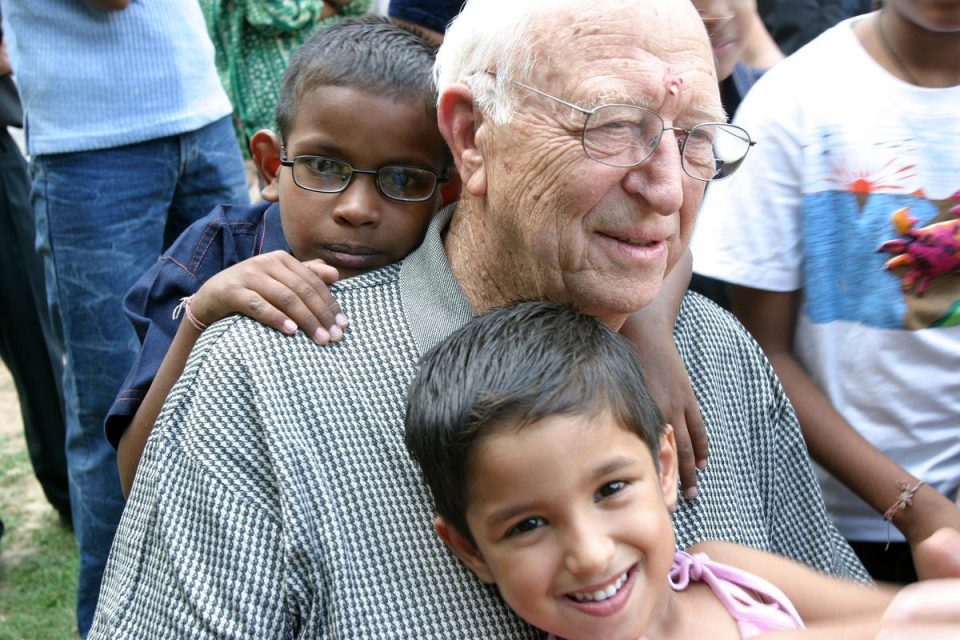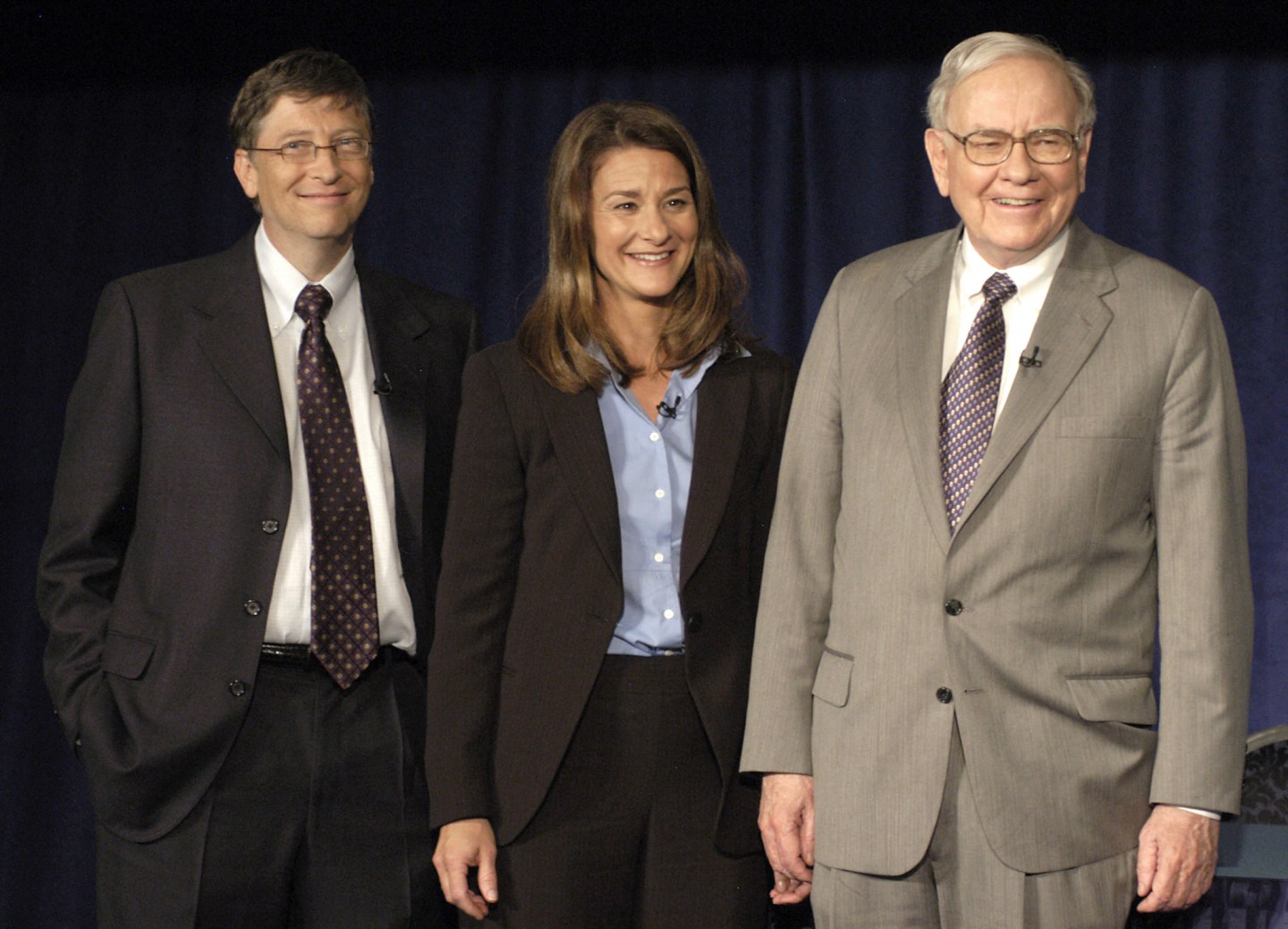The origin story of the Gates Foundation in 2000 has become a core part of the organization’s lore: Bill Gates and Melinda French Gates read a newspaper article about how millions of children around the world were dying from preventable causes such as diarrhea and pneumonia.
“That blew our minds,” the Gateses recall on the foundation’s website. “As new parents it hit us especially hard. If there’s anything worse than the death of a child, we said to each other, then surely, it’s the preventable death of a child.” The couple sent the article to Bill Gates’ father, Bill Sr., with a note:
“Dad, maybe we can do something about this.”
They could. Bill Gates, with a net worth around $60 billion at the time, was the richest person in the world, and the foundation Gates and French Gates founded became one of the world’s largest philanthropic entities: From $1 billion it spent that first year, the Bill & Melinda Gates Foundation, as it was then called, went on to disburse $100 billion in the last quarter-century.
Today, the Gates Foundation (as it was renamed last year) pledged to spend another $200 billion in the next 20 years, before shutting its doors.
On the foundation’s 25th anniversary, as Bill Gates announces his ambitious plan to hopefully eradicate some of the world’s deadliest infectious diseases, the fight against global poverty and preventable disease looks quite different than it did in 2000. The Trump administration has shut down America’s aid agency, USAID; opted out of the World Health Organization; and withdrawn funding from many domestic programs promoting equity and helping marginalized people. Other countries have cut back their aid also. There appears to be far less consensus around the notion that the wealthy—nations and individuals—have a responsibility to help those less fortunate around the world.
At the outset, ambitious as their mission was, the Gateses were far from alone in their conviction that many of the world’s biggest problems could be solved with fresh ideas and a whole lot of money. The turn of the century, before 9/11 and the financial crisis of 2008, was in retrospect a moment of striking global optimism: The Cold War was over and the AIDS epidemic in the wealthy world had been contained. The Digital Age was dawning, and there was a new urgency to bring the blessings of tech and medical innovation to every corner of the globe. Capitalism, it seemed, could be a benevolent force even for the world’s poorest. (Of course, not everyone agreed.)
The United Nations announced the Millennium Development Goals in 2000 to reduce maternal mortality, poverty, and deadly diseases around the globe, and all 189 member nations signed on. (In 2015, the initiative was rebranded as the Sustainable Development Goals.)
“That was the era where we were all in it together,” Ankur Vora, the Gates Foundation’s chief strategy officer, tells Fortune. “The whole world was focused on solving the injustices of our times.”

It was also a time when global public health wasn’t seen as a cause of only the political left. As economic globalization accelerated, the business-minded rationale for freeing the masses from poverty and illness and turning them into producers and customers seemed clear: Healthier and wealthier populations make for better trading partners and more stable geopolitical neighbors. They’re also less prone to conflict and strife, and less likely to send destabilizing waves of migrants and refugees across their borders.
In the U.S. there was bipartisan support from politicians and citizens to tackle the world’s infectious disease killers, as shown by Congress’s support of programs like the President’s Emergency Plan for AIDS Relief (PEPFAR), established under President George W. Bush in 2003. “I wish more people were aware [of it], because it is profound in terms of the report card for humanity,” Bill Gates said of PEPFAR, which has invested over $110 billion in the fight against HIV/AIDS, mostly in sub-Saharan Africa. Gates has long been a partner and supporter of the program.
“At the beginning of the millennium, there was a compassionate conservative agenda aligned around using America’s might toward breaking the back on a pandemic like HIV/AIDS,” said Joe Cerrell, the foundation’s managing director for Europe, the Middle East, and East Asia. “Christian conservatives said, It’s very much in America’s values to work on these issues that were afflicting so many people.”
The mood was far-reaching. Corporations promised to consider human rights, equity, and the environment in their business practices. In the U.K. then Prime Minister Tony Blair appeared with Gates in 2005 to support a Make Poverty History campaign, one of many simultaneous benefit concerts happening across the G8 states and South Africa. “That for me was a breakthrough,” recalls Cerrell, who was at the event with Gates and Blair. “We can get amazing minds, chancellors of the Exchequer, captains of the financial industry, advocates, [and] world leaders together and say, If we can agree on some of these things, we can raise resources and get these lifesaving interventions to people.”
In 2010, Gates and French Gates brainstormed with Warren Buffett, the second-largest donor to the foundation, about how to build a community of committed ultrawealthy donors, propelling them to launch the Giving Pledge in 2010. Since then, over 240 of the world’s wealthiest have signed on to a nonpolitical humanitarian agenda—a commitment to give at least half of their wealth back to society at their death or before.

The tide has decisively turned. Only 17% of the Sustainable Development Goals are on track. Some are moving along slowly, while others have stalled or even regressed, according to a 2024 report from the United Nations. The Gates Foundation and other organizations are working to make up for public health regression during the COVID-19 pandemic. Gates described it bleakly in his annual Goalkeepers progress report as “20 years of unprecedented progress followed by 5 years of stagnation.” PEPFAR’s future is now unclear amid the Trump administration’s cuts, and the Center for Global Development has estimated that 1.65 million lives could be lost in a year if U.S. aid for HIV prevention and treatment is cut off.
The drift away from the optimism of 2000 has been gradual. Donor fatigue and an empathy crisis appeared to be accelerating even before the Trump administration took a chain saw to USAID. But the rejection of almost all forms of humanitarian assistance in the current U.S. administration is forcing a debate over America’s responsibility to the rest of the world. As expressed by Secretary of State Marco Rubio, the administration’s belief is, “Every dollar we spend, every program we fund, and every policy we pursue must be justified with the answer to three simple questions: Does it make America safer? Does it make America stronger? Does it make America more prosperous?”
French Gates, and those who agree with her and her former husband, see this view of American interests as far too narrow. To illustrate her concerns about it, she told Fortune of seeing bags of food stamped with USAID’s logo being distributed in poor countries—and the goodwill that created. “Communities know that they were being fed by the American government,” she said. “But if we now just suddenly, in a big whoosh, pull back on that—can you imagine what they’re going to think about the Americans and American government? … We’ve built up trust. Trust takes a long time to build, but you can take it away so quickly. I think we need to be much more careful as a nation.”
Making that case is an uphill battle in 2025, when many Americans are worried about themselves and their families, says the foundation’s president of global policy and advocacy, Gargee Ghosh. “How do we re-explain the importance of this to citizens who are worried about their own heating bills and their own jobs?” she said. “How do we rebuild a sense that if I’m a mom, I understand that no mom should die in childbirth? … We’ve obviously not done a good enough job explaining that to people, or bringing the hearts and minds along with us.”
The Gateses proved themselves right 25 years ago: Many of the world’s most challenging global health problems can indeed be alleviated with proper funding. The childhood death rate, for example: In 2000 some 10 million children died before their fifth birthday; in 2023, half as many died.
Trust takes a long time to build, but you can take it away so quickly. I think we need to be much more careful as a nation.
Melinda Gates, philanthropist
Asking the right questions, crunching the data, and trying out good ideas could—and did—make a difference, as shown by the role of distributing mosquito nets in dramatically cutting malaria death rates, and progress toward a new and more effective TB vaccine. “Science has gone faster and is making more progress than I ever thought,” said Ghosh. At the same time, she added, “we’re playing defense on a lot of the stuff that we thought was stable ground for us. We thought there was a citizen support and understanding of global solidarity, that isn’t there.”
That solidarity, and the notion that wealthy individuals—and wealthy countries—have a responsibility to those less fortunate, are what must be rebuilt, French Gates argues. “If you’re a billionaire in the United States, you benefited from this country,” she said. “You benefited from good roads. You probably benefited somewhere along the way from the health sector. You probably benefited because maybe it was a good business climate, and you could start your business. People in other places don’t have those things, and so yes, we owe something back to society.”
Geoff Colvin contributed to this story.












